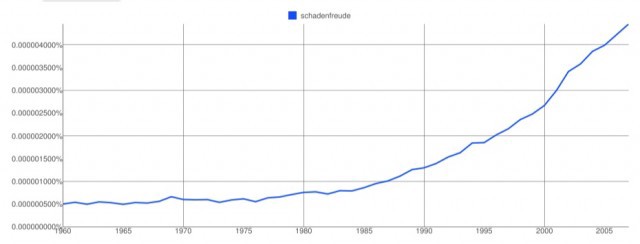A Joyful & Malicious History Of 'Schadenfreude'
A Joyful & Malicious History Of ‘Schadenfreude’
by Jane Hu

In an interview with Martha Stewart shortly before her 2003 indictment, Jeffrey Toobin asked the visibly exhausted celebrity if she felt herself the victim of “schadenfreude.” He didn’t expand upon the Germanism, and Stewart certainly didn’t need it defined.
Schadenfreude? I asked. “That’s the word,” she said. “I hear that, like, every day.” And she added, in her precise way, “Do you know how to spell it?”
While spelling the thing might be an issue, writers assume nowadays that when they say “schadenfreude,” readers know exactly what they mean. It’s defined as the “malicious enjoyment of the misfortunes of others” in the OED, which first included the word in 1982. The online OED traces key appearances of “schadenfreude” in English publications, the earliest of which is found in philologist Richard Chenevix Trench’s 1852 meditation on language, Study of Words. Trench’s citation is mostly a lament. Words such as “schadenfreude,” he remarks, reflect a degraded moral interiority: “… what a fearful thing is it that any language should have a word expressive of the pleasure which men feel at the calamities of others; for the existence of the word bears testimony to the thing.”
While Trench lists other examples of words that express the “pleasure which men feel at the calamities of others” (in Greek and also Latin), only the German version has entrenched itself in the English lexicon. And it’s not the only Germanism to do so — what might be surprising, though, is just how recently and rapidly such Germanisms have entered the American vocabulary. As we’ll see, while schadenfreude’s use in English texts begins in the mid-1800s, it only started making regular appearances in the past three decades. (As I type, Microsoft Word does not recognize “Germanism” as a word, but it does accept “schadenfreude.”) So you might as well learn how to spell it, since Deutsch is, apparently, the way we talk about our feelings now.
In a 2009 After Deadline post titled “The Age of Schadenfreude,” Times deputy news editor Philip B. Corbett observed:
Here’s an amazing fact: In 1980, according to our archive, the word “schadenfreude” did not appear in The New York Times. Not once.
This may seem hard to believe, since as a reader recently pointed out, we now appear to be living in the Golden Age of Schadenfreude. […]
In 1985, there was exactly one Times use of “schadenfreude,” in a Safire “On Language” column. In 1990, three uses, including one by an actual German. By 1995, we’re up to seven instances, still within reasonable limits for those who prefer their English mostly in English.
But the number begins to creep up in the late ’90s, then leaps to 28 in 2000. A brief decline in 2001, then another surge, to a record 40 uses in 2004. […]
So what’s with all the joy in pain? Is it something in the zeitgeist (62 uses in 2008, by the way)? Or is it just another verbal fad?
The Ngram for ‘schadenfreude’ corroborates Corbett’s observations:

While such statistics gesture toward an increase in the word’s use, they don’t explain the impetus behind its popularity.

Thomas Pynchon published his German-focused novel Gravity’s Rainbow in 1973 (back when ‘schadenfreude’ was nowhere to be found on the pages of the Times). While the text leaves many Germanisms undefined (Hexeszüchtigung, Wandervogel, Bürgerlichkeit, Brockengespenstphänomen), Pynchon nonetheless felt compelled to translate schadenfreude: “Like Adolf Hitler, Springer is easily tickled by what the Germans call Schadenfreude, the feeling of joy at another’s misfortune.” Pynchon presents schadenfreude as a malicious trait that’s specifically German, one that has no English equivalent if only, to borrow Trench’s words, because the English “moral and spiritual condition” has yet a need to express itself in such terms. As the Spectator put it in 1926: “There is no English word for Schadenfreude, because there is no such feeling here.”
Such logic no longer holds up. We use the word a lot — most often in relation to celebrities (Sasha Frere-Jones once titled a post on Beyoncé simply “Schadenfreude”) and athletic events (the combination of competitive aggression and the likelihood of physical injury is probably to blame). Broadway is fertile grounds for the cultivation of schadenfreudistic sentiments. Michael Schulman’s New Yorker review of Julie Taymor’s 2011 production of Spider-Man: Turn Off the Dark opens with the line: “New Yorkers excel at Schadenfreude.” Modulations of the word are also popular: You all remember Franzenfreude, of course? It was its own Twitter hashtag.
That feeling for when you come across a German word that signifies a human emotion mordantly paradoxical, and oh-so-human all at once? There ought to be a German word for that. Indeed, while the entire concept of the long-German-word-to-efficiently-express-complex-emotions has itself become a cliché, we continue to desire Germanisms that don’t yet exist. Just a few days ago, this gem popped up on my Twitter feed:
@caleb_crain
Caleb Crain What’s the long German word for posting a tweet that’s out of sync with the predominant mood and subject matter of the tweetstream?
Oct 16 via webFavoriteRetweetReply
Earlier this year, The Hairpin catalogued “German Words for Gchat-related Psychoemotional States,” while on this site, Balk has begun his own wish list for expressions to capture such emotions, to give one example, as “that sudden and jarring juxtaposition of feelings you experience when you finally realize that something you were certain was a parodic mash-up turns out to be absolutely sincere.”
Websites such as The Neologist help people discover “the soothing power of the German compound noun” with words like Palmenbepflanztes Immobiliengefängnisn (palm-begrowthed real-estate prison) and wahlunfruchtbar (infertile by choice). And on. And on.
Many websites dedicated to Germanisms exist. Of course, websites on many, many topics exist — still, it makes sense that this particular language niche would hold a special interest to people who spend a lot of time on the Internet. The distance inherent in online interaction is perhaps conducive to the projective and prescriptive quality of Germanisms — where rigid words encapsulate elaborate feelings.
Cultural criticism on the infiltration of German words into English jargon emphasizes Germany’s role in the two World Wars: Did Germanisms emerge from the collective consciousness of a country seen, especially in the last century, as one full of complicated emotions? Scholarly research has taken up the matter. Jordan Finkin’s article “The Poetics of Schadenfreude” explores how post-Holocaust Yiddish poetry played on the “constraints and connotations […] of the German language and of the Germanic component in light of the Holocaust” for new poetic possibilities — a co-opting of the aggressor’s language. Many of the examples of “schadenfreude,” in the OED, after all, include Germany as the object of such sadism, with people rejoicing in the country’s post-war status. To feel schadenfreude is to drawn a line between you and me — to separate your pain from my joy. The country that first articulated the perverse feeling of “schadenfreude” finds itself, in other languages, on its receiving end.
During the interwar year of 1920, Frederick Hamilton emphasized the philosophical distance between Germany and Britain:
The particular sentiment described in German as “Schadenfreude,” “pleasure over another’s troubles” (how characteristic it is that there should be no equivalent in any other language for this peculiarly Teutonic emotion!), makes but little appeal to the average Briton.
By leaving Germanisms untranslated, one always points to the sentiment expressed by the word as fundamentally and even organically German. My favorite, “Vergangenheitsbewältigung,” means roughly to overcome or to come to terms with the past. The word is most frequently used in speaking about the Holocaust. Overcoming the burden of history is not a sentiment singular to any one nation, but focusing on its hyper-specific idiomatic expression in German makes this overcoming specific to Germany. “Vergangenheitsbewältigung” always refers back to its land of origin, reminding us of Germany’s associations and actions with regard to two World Wars.
Part of the reason we fixate on Germany is certainly social, but also linguistic: the German semantic structure lends itself to the invention of compound words. In Gravity’s Rainbow, Pynchon notes “the German mania for name-giving, dividing the Creation finer and finer, analyzing, setting namer more hopelessly apart from named.” Naming is not only a form of identification or labeling, but also of creation. To the eye, mouth, and ear, capacious German words seem to embody and externalize the weight of difficult emotions.
Yet German compound words are as strikingly direct as they are metaphysical. German poet and translator Paul Celan observes that German, “for all its inalienable complexity of expression, is concerned with precision. It does not transfigure, does not ‘poetize,’ it names and posits, it tries to measure the realm of the given and the possible.” “Schadenfreude,” after all, is comprised of “Schaden” (harm) and “Freude” (joy), while “Vergangenheitsbewältigung” links “Vergangenheit” (past) with “Bewältigung” (overcoming). Germanisms are direct and clear, yet, from the perspective of an outsider, visually and sonically convoluted; this allows us to use them with a sense of amused detachment. We borrow their sentiments with a self-consciousness that seems to say, “we don’t really own these complex dispositions, nor take responsibility for their proliferation.”
Jane Hu is our official correspondent for very recent history.
When The Phone Doesn't Ring (Or Vibrate)
“After a first date on a Saturday night, if it gets past 11.48am on Monday without a text or call then there’s not much chance of a second outing, a survey has found.” Even better: “The three-day rule might have worked when all we had were landlines, but technology has revolutionised how we date. When everybody takes their mobile phone everywhere, waiting three days to get in touch just makes you look snooty or, worse, like you have run out of credit.”
Gays Brought Terribly Low by Heterosexual Newspaper's Makeovers

Finally, someone tells gay men what to wear! Not just any someone, but my one true fashion love, Cathy Horyn. Yet the results… well, the results here, where the Times has helped three gay male couples dress for their weddings, or for their anticipated weddings (couldn’t find three couples getting married SOON???), some things that concerned me.
• “’I’ve only been to one gay wedding,’ Mr. Bruno said as he was being prepped for his portrait with Mr. Ruales. ‘The couple wore dark suits with white button-downs, no ties.’” THEY DID??? AND YOU STILL TALK TO THEM?
• “Of all the outfits, Bruce was perhaps most excited by a pair of dove gray suits from Calvin Klein, which will be available at Men’s Wearhouse and tuxedo rental shops.” [*cries*]
• “’Until there are more examples — the gay beach wedding, the serious Four Seasons wedding — it’s hard to know what to market,’ said Michael Kors, who wed his partner, Lance LePere, on a beach in the Hamptons, with Mr. Kors in his customary black T-shirt and white jeans and Mr. LePere in a chambray shirt and chinos.” There is no gay wedding “market” and if there is it won’t be emanating from the boutiques of Michael Kors, home of the worst belts in the western world.
This is just not how I pictured gay wedding makeovers. Gay people are better than straight people. This dragging of them by their hair down into the straight bargain torture basement is really upsetting!
Here's Why You Should Date British Women
“One in five British women believe that the debilitating ‘man-flu’ disease which temporarily leaves sufferers prostrate on the sofa watching televised sports is real, according to a new study.”
Snoop Is 40!
Calvin Cordozar Broadus, Jr. turns forty years old today — incredible, if you remember what it was like to first hear his dulcet, melodic voice bouncing over the spine-tingling beat Dr. Dre made for the titular song of the 1992 Laurence Fishburne/Jeff Goldblum vehicle Deep Cover. Snoop Doggy Dogg, as he was known back then, already seemed like an ageless entity. And he’s stayed seeming that way. (Even after he dropped the “Doggy” in his name in the mid-90s.) If he is not the greatest or most important figure in the history of rap, he is probably the most famous and beloved worldwide. The way he reaches his arm around Barbara Walters in the above clip from a 2008 appearance on “The View” pretty much tells you everything you need to know about why this is.
What the hell, here are ten more videos that explain it well, too — a chronological display of the range and staying power that have made for such a long and successful career. Happy birthday, Snoop!
Prison Island Woman Doesn't Know Her Place
“Australia’s socialist PM under fire for failing to curtsey to the Queen (or bothering to wear a hat)”
Let's Just Stone NPR Liberal Lisa Simeone in the Town Square!

NPR’s Internal Affairs Department — in conjunction with its Office of Indefinite Detention and its Central Authority for Eliminating Wrong-Thinking — is finally weeding out the last known menace of its member networks: freelance opera contributor Lisa Simeone. She was the host of “Soundprint” (now fired), which aired on (but was not produced by) public radio affiliate WAMU, and is currently the host of the WDAV show “The World of Opera,” though not for long, as the officers at NPR are assisting in WDAV’s investigation that will surely convict her. Simeone is a member of October 2011, a frightening terrorist organization that opposes the endless war in Afghanistan, now in just its 11th year. (May the next 11 years in Afghanistan be as fruitful, and a noble blessing upon our military industrial complex!)
Anyway, now that the opera-loving jihadist will be purged from NPR’s member station rolls, we can all… safely… listen to… opera coverage on… public radio again.
What Words Mean
What Words Mean
“’Interesting’ means ‘I’m about to spend a paragraph on this, bear with me, it’s a bit obvious but needs to be in there. ‘Fascinating’ means ‘Actually this bit is interesting.’”
Let's Raise The Dead
Can we clone the woolly mammoth and bring it back into existence? Sure, why the hell not. In fact, I’ll even go so far to say that we should give another crack to any species that has gone extinct. It’ll be the ultimate prank! “Hey, welcome back! Oh, by the way, we’re really intent on killing the planet, so you’ve got about five years before the whole thing goes belly up. Enjoy!” I’d laugh, at least.
The Morning Of Death

Your sad lead of the day: “Lions and tigers and bears — all dead.” That includes the briefly famous Herpes Monkey, who was apparently eaten by a tiger. Also apparently dead: former Libyan leader Moammar Gaddafi. Good morning.
